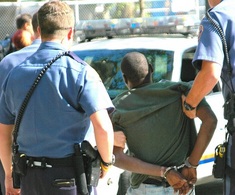For the past two weeks, the eyes of the country have been fixed upon Ferguson, Missouri, a suburb of St. Louis, where an unarmed, teenaged African-American named Mike Brown was shot and killed by a white police officer named Darren Wilson. While driving his patrol car, Wilson approached Brown and a friend as they walked in the middle of a street. Wilson ordered them to get on the sidewalk, and an argument ensued. Although the facts about what happened in the next few seconds are in dispute, the end result is clear: Wilson shot Brown six times, twice in the head.1
The racially charged shooting has torn the community apart, sparking protests and confrontations among citizens, journalists, and police officials. In response to this uproar, Missouri Governor Jay Nixon stepped in, imposed a curfew and deployed the National Guard to Ferguson.2 Across the rest of the nation, the shooting has renewed the debate about police procedures, and the militarization of local law enforcement.3
Cameras on Cops – The Mike Brown Law
In the wake of this tragedy, nearly 150,000 people signed an online petition on the White House’s petition website, urging President Obama’s administration to pursue a new federal law known as the “Mike Brown Law.” This law would require state and local police officers to wear body-mounted video cameras to record all interactions while on duty. The law would also provide additional federal funding to state and local police agencies for the purchase of the cameras and data storage for the video files they create.4
Under the White House’s policy, any petition that receives 100,000 or more signatures within 30 days of its posting requires a response from the administration. As of today, the White House has not responded.
Though the White House has yet to issue a response, the push for body-mounted cameras is not new. Last year, the police department in Rialto, California concluded a yearlong study in which officers wore cameras at all times during their patrols. The study found that the presence of the cameras changed the behavior of both officers and citizens dramatically. Complaints against Rialto police officers dropped 88 percent, and officer use of force against citizens dropped nearly 60 percent.5 Recently, police departments in larger cities, such as Los Angeles, New York, and Dallas, have begun to test the use of officer-worn cameras in the field.6
The Benefits and Burdens of a Mike Brown Law
Rialto’s police chief, William Farrar, sees the camera program as beneficial to both the officers and the public. “When you put a camera on a police officer, they tend to behave a little better, follow the rules a little better,” Chief Farrar said. “And if a citizen knows the officer is wearing a camera, chances are the citizen will behave a little better.” 7
A Mike Brown Law would not be uncharted territory for the federal government. Between 2000 and 2003, the U.S. Department of Justice awarded more than $21 million in federal grants to police agencies in 47 states and the District of Columbia for the purpose of funding a similar policy, the installation of dashboard-mounted cameras in police vehicles.8 Currently, more than 70% of law enforcement vehicles are equipped with a camera system.9
A study of the use of vehicle cameras reflects the findings in the Rialto study. Since the installation of vehicle camera systems, departments have reported positive enhancements to officer safety, professionalism, training, and performance. Police agencies have reported a reduction in the number of valid complaints against officers, increased accuracy in evidence gathering through the use of video and audio recordings, and an improvement in public opinion.10
Of course, such a law would be expensive to implement. The Spokane Police Department paid $733,000 for the purchase of 220 cameras, plus an annual fee for data storage.11 Equipping every officer in the country with a camera would produce a high volume of video and audio footage to be logged and stored, which could lead to police departments having to outsource this task and giving access to these interactions to third parties.
Perhaps most important of all, a Mike Brown Law could raise concerns of privacy. The cameras would record every activity the officer is involved in, including any investigation within a private home or other private property. Without additional safeguards controlling access to the footage, this could lead to unauthorized access to private information.
While these potential drawbacks of a Mike Brown Law are not trivial, the bottom line is that studies of these systems paint an overwhelmingly positive picture for such a program. Body cameras could prevent unnecessary trials by preserving a true and unbiased account of each police encounter, and the improvement in behavior on both sides of the law could reduce the incidences of violence when the law and the public collide.
No one can say for certain whether a camera would have prevented Mike Brown’s death; however, there is strong evidence which suggests that if the Mike Brown law goes into effect nationwide, it would prevent countless deaths caused by the actions of members of law enforcement.
Share Your Feedback With Us
At Wallin & Klarich, we encourage feedback from our clients and our readers. Tell us what you think about this topic. Should the federal government enact a law that requires police to wear a video recording device at all times while on duty? What benefits do you see in making this a requirement? What rules should be in place regarding the cameras? Please feel free to leave your comments below.
1. [http://www.cnn.com/2014/08/19/us/ferguson-michael-brown-dueling-narratives/]↩
2. [http://abcnews.go.com/US/wireStory/missouri-governor-sends-national-guard-ferguson-25017916]↩
3. [http://www.dailydot.com/politics/mike-browns-law-white-house-petition-ferguson/]↩
4. [https://petitions.whitehouse.gov/petition/mike-brown-law-requires-all-state-county-and-local-police-wear-camera/8tlS5czf]↩
5. [http://www.nytimes.com/2013/08/22/us/in-california-a-champion-for-police-cameras.html?pagewanted=all&_r=0]↩
6. [Id.]↩
7. [Id.]↩
8. [http://www.policechiefmagazine.org/magazine/index.cfm?fuseaction=display_arch&article_id=358&issue_id=82004]↩
9. [Id.]↩
10. [Id.]↩
11. [http://www.policeone.com/police-products/body-cameras/articles/6955826-Wash-chief-weighs-pros-and-cons-of-body-cameras/.]↩





